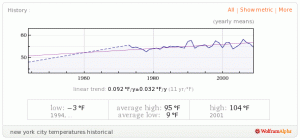Back in the 1960s, New York City introduced a “heat law,” a requirement that (residential) landlords provide heat for apartments between October 1st and May 31st in any given year if the outside temperature falls below 55 degrees during the day or 40 degrees at night. (Actually, the law seems to date to the 1940s, the era when rent control was also introduced in New York, but to have been updated in 1966.) If this seems like an odd legal requirement—why wouldn’t landlords heat their buildings?—then it’s possible you, dear reader, have never rented an apartment in New York or elsewhere. The struggle between landlord and tenant is often made of such complaints, with some landlords seeking every financial advantage out of even the smallest or most mean-spirited withholding of services. New York City’s law is well-intentioned.
This law is also out-of-date. Temperatures in New York have been rising. By one measure, the winters in New York State are an average of 4 degrees warmer in the period 1990-1999 versus 1900-1909. Data from Wolfram|Alpha shows a fairly clear trend of rising temperatures in New York City from 1950 to now (and see charts here). This is not to say that New York is lacking in winter—indeed, this past winter was one of the most “wintry” ever, with record-setting snowfalls not just in New York but across much of the country. Copious snow, however, is no proof that our weather and our temperatures haven’t changed. Observationally, I can say that winters in New York have (since 1995) started increasingly late, and that the warmth of summer (skipping over much of the moderate temperatures of spring) have arrived increasingly early.
Why does this matter? Because my colleagues and I have been sweating it out in our office for the last week, in a modern glass office building without air conditioning. Well, not without air conditioning—the building has AC. The landlord simply refuses to turn it on before the contractually required date of May 15th, even if the temperatures both inside and out would (according to common sense) demand it. And demand it they do: it has been well into the 70s and sometimes the 80s for more than the last 5 business days.
I don’t know that New York needs another law, about this or anything else, but I would propose it as a serious contender, an important counter-balance to the existing heat law. Perhaps our heating and air conditioning systems should become more energy efficient, and less damaging to the environment; that is a worthy goal, and could well be part of the legislation. For now, though, the situation seems to demand simple fairness: if New York can require landlords to heat us up, shouldn’t it also require them to cool us down, too?




